Epinephrin Study guides, Class notes & Summaries
Looking for the best study guides, study notes and summaries about Epinephrin? On this page you'll find 214 study documents about Epinephrin.
Page 2 out of 214 results
Sort by
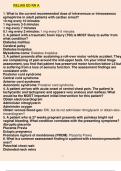
-
Relias ED RN A 1. What is the current recommended dose of intravenous or intraosseous epinephrine in adult patients with cardiac arrest? 10 mg every 10 minutes 1 mg every 3-5 minutes 1 mg every 7 minutes 0.1 mg every 2 minutes: 1 mg every 3-5 minutes 2. A
- Exam (elaborations) • 13 pages • 2023
-
- $9.49
- + learn more
Relias ED RN A 1. What is the current recommended dose of intravenous or intraosseous epinephrine in adult patients with cardiac arrest? 10 mg every 10 minutes 1 mg every 3-5 minutes 1 mg every 7 minutes 0.1 mg every 2 minutes: 1 mg every 3-5 minutes 2. A patient with a traumatic brain injury (TBI) is MOST likely to suffer from
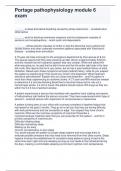
-
Portage pathophysiology module 6 exam _______ is sleep disordered breathing caused by airway obstruction. - ansobstructive sleep apnea _______ work by blocking membrane receptors and the subsequent reuptake of serotonin and norepinephrine. -
- Exam (elaborations) • 71 pages • 2024
-
- $17.99
- + learn more
Portage pathophysiology module 6 exam _______ is sleep disordered breathing caused by airway obstruction. - ansobstructive sleep apnea _______ work by blocking membrane receptors and the subsequent reuptake of serotonin and norepinephrine. - anstri-cyclic anti-depressants ________ utilizes electric impulses to inhibit or stop the abnormal nerve activity that causes tremor and other unwanted movement patterns associated with Parkinson's disease. - ansdeep brain sti...
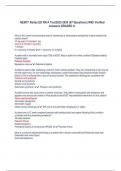
-
NEW!!! Relias ED RN A Test2023-2024 (67 Questions) With Verified Answers GRADED A What is the current recommended dose of intravenous or intraosseous epinephrine in adult patients with cardiac arrest? 10 mg every 10 minutes 1 mg every 3-5 minutes 1 mg eve
- Exam (elaborations) • 20 pages • 2024
- Available in package deal
-
- $11.99
- + learn more
NEW!!! Relias ED RN A Test (67 Questions) With Verified Answers GRADED A What is the current recommended dose of intravenous or intraosseous epinephrine in adult patients with cardiac arrest? 10 mg every 10 minutes 1 mg every 3-5 minutes 1 mg every 7 minutes 0.1 mg every 2 minutes 1 mg every 3-5 minutes A patient with a traumatic brain injury (TBI) is MOST likely to suffer from what condition? Diabetes mellitus Cerebral palsy Diabetes Insipidus Myxedema coma Diabetes Insipidus A patient pre...
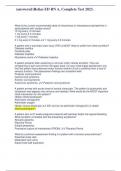
-
(answered)Relias ED RN A, Complete Test 2023. What is the current recommended dose of intravenous or intraosseous epinephrine in adult patients with cardiac arrest? 10 mg every 10 minutes 1 mg every 3-5 minutes 1 mg every 7 minutes 0.1 mg every 2 minutes
- Exam (elaborations) • 22 pages • 2024
-
- $17.99
- + learn more
(answered)Relias ED RN A, Complete Test 2023. What is the current recommended dose of intravenous or intraosseous epinephrine in adult patients with cardiac arrest? 10 mg every 10 minutes 1 mg every 3-5 minutes 1 mg every 7 minutes 0.1 mg every 2 minutes 1 mg every 3-5 minutes A patient with a traumatic brain injury (TBI) is MOST likely to suffer from what condition? Diabetes mellitus Cerebral palsy Diabetes Insipidus Myxedema coma Diabetes Insipidus A patient presents after sustaining a roll...
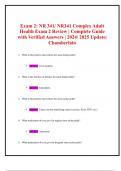
-
Exam 2: NR 341/ NR341 Complex Adult Health Exam 2 Review | Complete Guide with Verified Answers | 2024/ 2025 Update| Chamberlain
- Exam (elaborations) • 21 pages • 2024
-
- $10.99
- + learn more
Exam 2: NR 341/ NR341 Complex Adult Health Exam 2 Review | Complete Guide with Verified Answers | 2024/ 2025 Update| Chamberlain 1. What is the priority intervention for sinus bradycardia? Answer: Give atropine 2. What is the 2nd line of defense for sinus bradycardia? Answer: Epinephrin 3. What is the priority intervention for sinus tachycardia? Answer: Figure out the underlying cause (exercise, fever, HTN, etc.) 4. What medication do you give for regular sinus tachycardi...

-
Relias ED RN A, Complete Test Fall 2023 What is the current recommended dose of intravenous or intraosseous epinephrine in adult patients with cardiac arrest? 10 mg every 10 minutes 1 mg every 3-5 minutes 1 mg every 7 minutes 0.1 mg every 2 minutes A pati
- Exam (elaborations) • 22 pages • 2023
- Available in package deal
-
- $15.99
- + learn more
Relias ED RN A, Complete Test Fall 2023 What is the current recommended dose of intravenous or intraosseous epinephrine in adult patients with cardiac arrest? 10 mg every 10 minutes 1 mg every 3-5 minutes 1 mg every 7 minutes 0.1 mg every 2 minutes A patient with a traumatic brain injury (TBI) is MOST likely to suffer from what condition? Diabetes mellitus Cerebral palsy Diabetes Insipidus Myxedema coma A patient presents after sustaining a roll-over motor vehicle accident. They are complaining ...
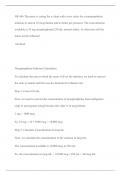
-
NR 446 The nurse is caring for a client with a new order for a norepinephrine infusion to
- Summary • 2 pages • 2024
-
- $7.99
- + learn more
NR 446 The nurse is caring for a client with a new order for a norepinephrine infusion to NR 446 The nurse is caring for a client with a new order for a norepinephrine infusion to start at 10 mcg/minute and to titrate per protocol. The concentration available is 10 mg norepinephrine/250 mL normal saline. At what rate will the nurse set the infusion? mL/hourNorepinephrine Infusion CalculationTo calculate the rate at which the nurse will set the infusion, we need to convert the units to match a...
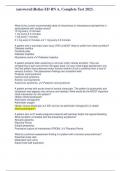
-
Relias ED RN A, Complete Test Fall 2023 What is the current recommended dose of intravenous or intraosseous epinephrine in adult patients with cardiac arrest? 10 mg every 10 minutes 1 mg every 3-5 minutes 1 mg every 7 minutes 0.1 mg every 2 minutes A pati
- Exam (elaborations) • 22 pages • 2023
-
- $7.90
- + learn more
Relias ED RN A, Complete Test Fall 2023 What is the current recommended dose of intravenous or intraosseous epinephrine in adult patients with cardiac arrest? 10 mg every 10 minutes 1 mg every 3-5 minutes 1 mg every 7 minutes 0.1 mg every 2 minutes A patient with a traumatic brain injury (TBI) is MOST likely to suffer from what condition? Diabetes mellitus Cerebral palsy Diabetes Insipidus Myxedema coma A patient presents after sustaining a roll-over motor vehicle accident. They are complaining ...

-
RELIAS ED RN A, EXAM 2022-2024 QUESTIONS AND 100%CORRECT ANSWERS What is the current recommended dose of intravenous or intraosseous epinephrine in adult patients with cardiac arrest? 10 mg every 10 minutes 1 mg every 3-5 minutes 1 mg ever
- Exam (elaborations) • 23 pages • 2023
-
- $23.99
- + learn more
RELIAS ED RN A, EXAM 2022-2024 QUESTIONS AND 100%CORRECT ANSWERS What is the current recommended dose of intravenous or intraosseous epinephrine in adult patients with cardiac arrest? 10 mg every 10 minutes 1 mg every 3-5 minutes 1 mg every 7 minutes 0.1 mg every 2 minutes 1 mg every 3-5 minutes A patient with a traumatic brain injury (TBI) is MOST likely to suffer from what condition? Diabetes mellitus Cerebral palsy Diabetes Insipidus Myxedema coma...
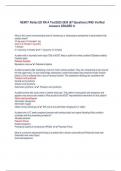
-
NEW!!! Relias ED RN A Test2023-2024 (67 Questions) With Verified Answers GRADED A What is the current recommended dose of intravenous or intraosseous epinephrine in adult patients with cardiac arrest? 10 mg every 10 minutes 1 mg every 3-5 minutes 1 mg eve
- Exam (elaborations) • 20 pages • 2024
-
- $17.99
- + learn more
NEW!!! Relias ED RN A Test (67 Questions) With Verified Answers GRADED A What is the current recommended dose of intravenous or intraosseous epinephrine in adult patients with cardiac arrest? 10 mg every 10 minutes 1 mg every 3-5 minutes 1 mg every 7 minutes 0.1 mg every 2 minutes 1 mg every 3-5 minutes A patient with a traumatic brain injury (TBI) is MOST likely to suffer from what condition? Diabetes mellitus Cerebral palsy Diabetes Insipidus Myxedema coma Diabetes Insipidus A patient pre...

$6.50 for your textbook summary multiplied by 100 fellow students... Do the math: that's a lot of money! Don't be a thief of your own wallet and start uploading yours now. Discover all about earning on Stuvia


